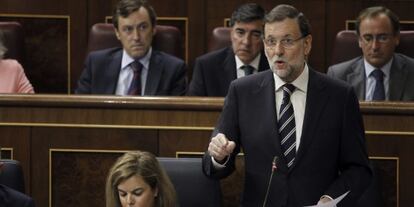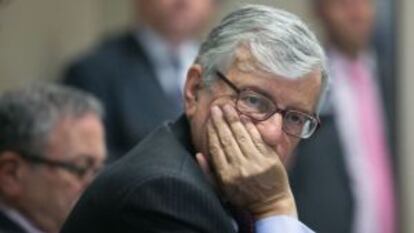Referendums lead to poverty, PM warns
Mariano Rajoy's voices thoughts on Scottish independence vote as a warning to Catalonia

A day before Scotland’s independence referendum, Spanish Prime Minister Mariano Rajoy warned that such popular plebiscites “provoke recessions and poverty,” and constitute “a blow below the European Union’s belt.”
Rajoy, of the center-right Popular Party (PP), was making a clear reference to the Catalan referendum on self-rule that has been scheduled for November 9, but which his government considers to be illegal.
Asked in Congress about his thoughts on the Scottish issue, Rajoy said that “there are many differences between the process going on in Scotland and the one here. The main one is that Scotland barely has any devolved powers” compared to Catalonia and other Spanish regions with a high degree of self-rule.
The Spanish PM also warned that Brussels will not make it easy for newly independent countries to rejoin the EU, and that this could take up to eight years. The EU, he said, was created “for integration, not for separation.”
In 2008, the Constitutional Court voted down an attempt by the Basque government to hold a similar referendum
A Catalan deputy in Congress, Pere Macías of CiU – the nationalist bloc that governs Catalonia – praised British PM David Cameron for authorizing the vote in Scotland and “choosing to convince rather than conquer.”
“Do you think that silencing the citizens and knocking down your adversaries will end the problem?” he asked.
The Rajoy administration's refusal to allow the Catalan plebiscite rests on the basis that the Spanish Constitution does not allow for unilateral, regional referendums. Instead, it says, Catalan nationalists should push for constitutional reform to make their vote legal.
As the November date looms nearer, the central and Catalan governments have been trading barbs over the issue of the referendum. While regional premier Artur Mas has stated for months that the vote would take place with or without Madrid’s support, this week he said that the referendum needs to have “full democratic guarantees” and appeared to suggest the possibility of early elections in Catalonia if the vote falls through.

But the central government is getting its legal weapons ready in case Mas decides to go through with it anyway. Attorney-General Eduardo Torres-Dulce has convened the chief attorneys of Catalonia to a meeting on Thursday to go over their options in a referendum scenario.
So far there is no basis for action by the Attorney’s office as the Catalan government has not yet incurred in any illegal action. This would be the case, however, if it went ahead with the November 9 vote after a negative ruling by the Constitutional Court.
Torres-Dulce said on Tuesday that “the Attorney’s office will act” if laws are infringed in Catalonia, as it would in Asturias or Andalusia. “Without the supporting framework of the law, this would be a jungle,” he said.
There is a precedent for this in recent Spanish history. In 2008, the Constitutional Court unanimously voted down an attempt by the Basque government to hold a similar referendum.
Tu suscripción se está usando en otro dispositivo
¿Quieres añadir otro usuario a tu suscripción?
Si continúas leyendo en este dispositivo, no se podrá leer en el otro.
FlechaTu suscripción se está usando en otro dispositivo y solo puedes acceder a EL PAÍS desde un dispositivo a la vez.
Si quieres compartir tu cuenta, cambia tu suscripción a la modalidad Premium, así podrás añadir otro usuario. Cada uno accederá con su propia cuenta de email, lo que os permitirá personalizar vuestra experiencia en EL PAÍS.
¿Tienes una suscripción de empresa? Accede aquí para contratar más cuentas.
En el caso de no saber quién está usando tu cuenta, te recomendamos cambiar tu contraseña aquí.
Si decides continuar compartiendo tu cuenta, este mensaje se mostrará en tu dispositivo y en el de la otra persona que está usando tu cuenta de forma indefinida, afectando a tu experiencia de lectura. Puedes consultar aquí los términos y condiciones de la suscripción digital.








































